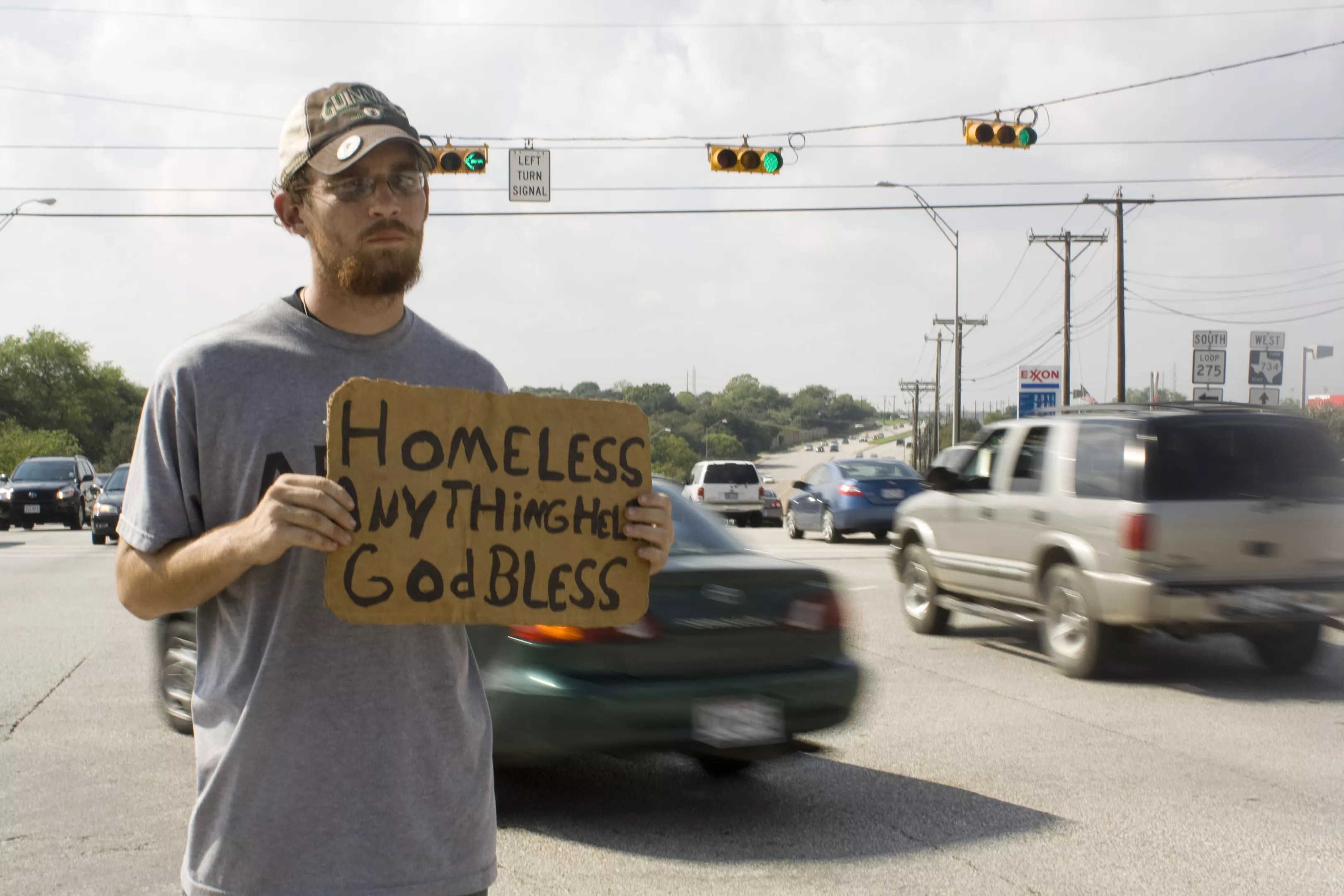
Hannly Sam via Flickr

Audio By Carbonatix
It seemed like it was only a matter of time before Dallas would be sued over an ordinance that banned people from standing on medians. It was.
University of Texas at Arlington professor Hannah Lebovits said she worked with the Texas Civil Rights Project to file suit against the city this week over the ordinance. Lebovits said in a post on Twitter that she and three others have filed a First Amendment challenge against the city.
“This is what we call ‘engaged scholarship,'” Lebovits wrote.
The city billed the ordinance as a public safety measure, saying people shouldn’t be allowed to stand on medians 6 feet wide or narrower because they could get hit by a car. The ordinance made it a Class C misdemeanor punishable by a fine of up to $500. Dallas has been trying to rid itself of panhandlers for years, and you know who stands on medians to beg for money? Panhandlers.
The way in which the city’s ordinance was written didn’t specifically target panhandlers. Instead, it sounds like just about anyone could get stuck with a fine for standing on a median. If that’s how the ordinance is enforced, no problem, as far as the First Amendment is concerned. But there are reasons to believe this isn’t how it would be enforced.
The Dallas Police Department’s own chief said officers would use discretion when enforcing the ordinance and that it wouldn’t be their main focus. The interim city marshal said its officers wouldn’t be patrolling Dallas medians to enforce the ordinance. Instead, enforcement would most likely occur when marshals help the City Homeless Solutions and Crisis Management team as they try to provide services to the homeless. That make it sound like the city contends it will enforce the ordinance only against homeless people standing on medians and asking for money, which is protected speech under the First Amendment.
“This lawsuit was inevitable.” – Adam Bazaldua, Dallas City Council
If it weren’t for Dallas City Council member Adam Bazaldua, the ordinance would have been passed unanimously in late October. At the time, Bazaldua said he didn’t support the ordinance because it went against the city’s goal to deprioritize low-level offenses. He also said it seemed to criminalize poverty.
“This lawsuit was inevitable, and aside from the unconstitutionality of the ordinance, this is exactly why I always felt that passing this was irresponsible and negligent of our fiduciary responsibility to the city,” Bazaldua said in a text to the Observer.
The ACLU even told D Magazine shortly after the ordinance was passed that it was “very possible” someone could sue over it. The city did not respond to a request for comment Wednesday afternoon but often declines to provide statements on pending litigation.
Lebovits studies homelessness and teaches about urban planning and public affairs and policy. She said she does her best to embed herself into the homeless community to get a better understanding of their needs. That sometimes takes her to medians where homeless people may be asking for money.
“It takes me to medians. It takes me to street corners,” she said. “It takes me to the actual sites in which people are engaging in this behavior, not only so that I can observe these individuals but also so that they can maintain their practice and whatever they’re doing while engaging with me.”
So, the ordinance could directly affect her work. “The ordinance, as the city of Dallas has passed it, would criminalize my actions standing on the medians while engaging in research, while engaging in outreach, while engaging in just general empathy and kindness. They’re criminalizing that behavior.”
The Texas Civil Rights Project filed the suit with Southern Methodist University First Amendment Law Clinic and Waters Kraus & Paul, LLP, on behalf of Lebovits and three others, two of whom are homeless people living in the city of Dallas.
“I live in constant fear of police harassment and enforcement of the newly passed ordinance.” – Alton Waggoner, homeless Dallas resident
“To get the funds I need for my basic survival, I frequently stand within four feet of the street and use medians of less than six feet to panhandle,” Alton Waggoner, one of the homeless plaintiffs in the lawsuit said in the press release. “Without the ability to do so, it would be impossible to buy food, water, and other basic necessities. I live in constant fear of police harassment and enforcement of the newly passed ordinance.”
The other homeless plaintiff is Teri Heishman. “The new ordinance poses a serious barrier for my survival because it prevents me from even sitting on the sidewalk or street corner to ask pedestrians for help,” Heishman said in the press release. “I have no money to pay a citation, but panhandling is currently my only method of survival.”
The third plaintiff is Kawana Scott, community organizer and chair of the Dallas Alliance Against Racist and Political Repression. Scott said she worries about the implications the ordinance has for protesters.
“Medians give demonstrators unique access to the public,” Scott said in the press release. “My use of medians for First Amendment activities is informed by the history of the Civil Rights Movement, where rallies and protests frequently occurred on medians and areas adjacent to the streets and were critical to achieving civil liberties victories.”